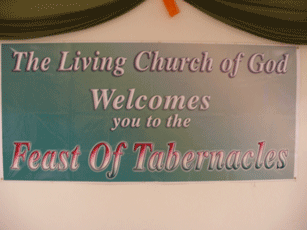Sabbath, Sunday, CG7, UCG, LCG, CGI, PCG, ICG, R. Ames, and R.C. Meredith in the News
Sunday, March 16th, 2008
Tomorrow’s World Presenter Richard Ames with a “Telly” Award
The following was in the news today:
SABBATH VS. SUNDAY: THE REST OF THE STORY WorldNetDaily Exclusive
‘Deception’: Christians war over worship day
Posted: March 16, 2008
5:24 pm EasternBy Joe Kovacs
Two thousand years after Jesus walked the Earth, Christians are at war with each other concerning – as strange as it may sound – a day of the week mentioned in the Ten Commandments.The issue boils down to: “When is God’s Sabbath?” In other words, what is His holy day of rest?Most Christians today think it’s Sunday, when the majority of churches hold services.
But others confidently say it’s Saturday, calling Sunday worship “the most flagrant error of mainstream Christianity,” believing Sunday-keepers are victims of clever deception…
In the King James Version of the Bible, the word “Sabbath” appears 137 times. The word “Sunday” is absent, though its equivalent, the first day of the week, occurs eight times – nine if the “first day” of creation is counted.
Some examples of the use of Sabbath include:
- “Six days shall work be done, but on the seventh day there shall be to you an holy day, a sabbath of rest to the LORD: whosoever doeth work therein shall be put to death.” (Exodus 35:2)
- “But pray ye that your flight be not in winter, neither on the sabbath day.” (Matthew 24:20)
- “Therefore the Son of man is Lord also of the sabbath.” (Mark 2:28)
Most biblical scholars have little disagreement when asked what day the Bible specifically calls the Sabbath.
“The seventh day, Saturday,” says Richard Bauckham, professor of New Testament at the University of St. Andrews in Scotland. “No other day is called the Sabbath in Old or New Testaments.”
In 2001, Jan Marcussen, a Seventh-Day Adventist from Thompsonville, Ill., was so sure there was no Bible verse declaring the first day to be the Sabbath, he offered up to $1 million for clear, Scriptural proof.
“I didn’t get even one response claiming the $1 million from any theologian, bishop, cardinal, pope or anyone else,” Marcussen, author of “National Sunday Law,” told WND. “Why not? Because they can’t. [Observing Sunday as the Sabbath] is the biggest hoax the world has ever seen.”
But while the Bible never calls the first day of the week a Sabbath, the vast majority of Christians today gather for worship then. Many think Sabbath-keeping was either abolished or moved to Sunday once Jesus rose from the grave.
“There’s not a simple answer,” said Dr. Roger Felipe, a Baptist preacher from Marco Island, Fla., who is also director of programs for Trinity Evangelical Divinity School, part of Trinity International University. “From [today’s] Christian point of view, the Sabbath is Sunday.”
There is little, if any, argument Jesus and His fellow Jews observed the Sabbath on the seventh day of the week, as the Bible states, “as his custom was, he went into the synagogue on the sabbath day, and stood up to read.” (Luke 4:16)…
1998…Pope John Paul II…referred to the origins of Sunday-keeping.
“In the weekly reckoning of time, Sunday recalls the day of Christ’s Resurrection,” the pope stated.
But the idea Jesus rose from the dead on a Sunday is not universal.
The Bible is actually silent on the precise moment of resurrection. Jesus’ followers came to His tomb before dawn on the first day of the week (Sunday), but they did not witness Him coming back to life. They merely found an empty tomb.
Even the late Rev. Jerry Falwell, a Sunday-keeper and chancellor of Liberty University in Lynchburg, Va., agreed with that timetable, telling WND in 2001, “I personally believe He was crucified on Wednesday evening … and rose after 6 p.m. Saturday evening.”
Most Christians today think Jesus died on a Friday and rose on Sunday. They point to Scriptures indicating a Sabbath day followed Jesus’ execution. But Sabbath-keepers claim it was not the weekly Sabbath of Saturday approaching. Rather, they say it was an annual Sabbath, a “high” holy day in the Hebrew calendar known as the Feast of Unleavened Bread, which supposedly occurred on a Thursday the week Jesus was killed. The Gospel of John mentions that Sabbath was the annual type.
“The Jews therefore, because it was the preparation, that the bodies should not remain upon the cross on the sabbath day, (for that sabbath day was an high day,) … .” (John 19:31)
In other words, Sabbatarians say there was more than one day of rest that week. Their timeline has Jesus slain on Wednesday – the day before the “high day” annual Sabbath on Thursday. They believe Jesus was in the grave for a full three days and three nights, finally arising Saturday evening, the second Sabbath of the week.
The mention of “three days and three nights” is important for many, as Jesus used that phrase to prove His divine identity:
“For as Jonah was in the belly of the great fish for three days and three nights, so I, the Son of Man, will be in the heart of the earth for three days and three nights.” (Matthew 12:40, New Living Translation)…
Beyond the resurrection issue, there are several Bible references to “the first day of the week,” none of which are clear on the Sabbath issue.
“The New Testament evidence is not conclusive, and nowhere ‘ordains’ or instructs [Sunday-keeping],” said Margaret M. Mitchell, professor of New Testament and Early Christian Literature at the University of Chicago Divinity School…
Christian facts, pagan Mithras
One of the Roman names for this “Invincible Sun” god in the days of the apostles was Mithras. There are striking similarities between the ancient worship of Mithras and today’s Christianity, leading some to think early Christians adopted Sunday worship from heathen customs.
For instance, Mithraism’s sacred day of Sunday was said to be called “the Lord’s Day.”
Donald Morse, a retired professor at Temple University, wrote a 1999 essay comparing the tenets of Mithraism to modern Christianity, explaining Mithras was worshipped on Sunday; was born of a virgin known as the “mother of God” on Dec. 25; was part of a holy trinity; and had a “Last Supper” with his 12 followers before his death and resurrection at Easter time near the spring equinox…
Mithras (from Wikipedia)For instance, Mithraism’s sacred day of Sunday was said to be called “the Lord’s Day.”
Donald Morse, a retired professor at Temple University, wrote a 1999 essay comparing the tenets of Mithraism to modern Christianity, explaining Mithras was worshipped on Sunday; was born of a virgin known as the “mother of God” on Dec. 25; was part of a holy trinity; and had a “Last Supper” with his 12 followers before his death and resurrection at Easter time near the spring equinox…
The Catholic Encyclopedia even refers to Sabbath-keeping as “the superstitious observance of Saturday,” noting it was forbidden by that council.
Coming to America
Christians observing the Sabbath on Saturday also spread throughout America, but in fewer numbers than Sunday-keepers.
The …Church of God (Seventh Day) – which boasts more than 200 congregations in the U.S. and Canada and a worldwide fellowship of more than 300,000.
Other Christians promoting Saturday rest include many offshoots of the Worldwide Church of God, such as the United Church of God, Living Church of God, Church of God International, Philadelphia Church of God and Intercontinental Church of God.
Messianic Jews, including Dallas-based Zola Levitt Ministries, are also seventh-day proponents.
Some Sabbatarians, such as Richard Ames of the Living Church of God, produce TV shows like “Tomorrow’s World,” asking, “Which day is the Christian Sabbath?”
On one program, Ames points to Luke 4:16 in the Bible and says, “It was Jesus’ regular custom to worship on the Sabbath, and since that time, and centuries before, the Jewish community has very carefully documented their observance of the seventh-day Sabbath, Saturday. In other words, history demonstrates that time has not been lost, that the seven-day cycle has been accurately recorded to this day.”
In another episode, Ames’ colleague, Roderick C. Meredith, calls Sunday observance “the most flagrant error of mainstream Christianity” and “the most obvious deception of all.”
“Do you realize that this deception is blinding millions of people from knowing God?” asks Meredith.
Despite such rhetoric, many Catholic and Protestant Sunday-keepers reject Sabbath-keeping on Saturday…
Back in Florida, Sunday-keeper Roger Felipe thinks God is not overly concerned with the Sabbath issue.
“Paul is very clear that we Christians don’t use [one particular day] as a determining factor if someone is right with God,” Felipe said.
At the same time, though, the minister supports the idea of resting one day each week to stay on track with God.
“Humanity has forsaken the importance of Sabbath rest,” he said. “God desires us to be renewed spiritually. We should observe a day … to be consecrated and to be devoted to God, to be renewed and refreshed. In terms of affecting the human quality of life, it would do us very well to observe a Sabbath rest.” http://www.worldnetdaily.com/index.php?fa=PAGE.printable&pageId=57978
Notice how even truthful Sunday supporters admit that the Sabbath and not Sunday is the day that is biblical. And some understand that Jesus was resurrected on Saturday.
It is because of “traditions of men” (called ” [today’s] Christian point of view” above) that most who profess Christ accept Sunday.
Of course, true Christians do not war (please see Military Service and the Churches of God: Do Real Christians Participate in Carnal Warfare? )–but Jesus and Paul did point out errors in religion based upon traditions. And true Christians believe the commandments of God over the tradition of men as Jesus instructed us to do (Matthew 15:3-9).
However, since the Apostle Paul was mentioned in the article, Christians would well to heed the fact that he did tell Christians to observe a certain day–the seventh.
Notice that the Apostle Paul was inspired to write:
Now we who have believed enter that rest, just as God has said, “So I declared on oath in my anger, ‘They shall never enter my rest.'” And yet his work has been finished since the creation of the world. For somewhere he has spoken about the seventh day in these words: “And on the seventh day God rested from all his work.” And again in the passage above he says, “They shall never enter my rest.” It still remains that some will enter that rest, and those who formerly had the gospel preached to them did not go in, because of their disobedience…There remains, then, a Sabbath-rest for the people of God; for anyone who enters God’s rest also rests from his own work, just as God did from his. Let us, therefore, make every effort to enter that rest, so that no one will fall by following their example of disobedience (Hebrews 4:3-6,9-11, NIV).
This clearly shows that the command to keep the seventh day Sabbath is in the New Testament. It also shows that only those who will not observe it because of their disobedience argue otherwise. And that is why Paul observed it. Even Origen understood some of what Paul wrote above as he wrote:
But what is the feast of the Sabbath except that which the apostle speaks, “There remaineth therefore a Sabbatism,” that is, the observance of the Sabbath, by the people of God…let us see how the Sabbath ought to be observed by a Christian. On the Sabbath-day all worldly labors ought to be abstained from…give yourselves up to spiritual exercises, repairing to church, attending to sacred reading and instruction…this is the observance of the Christian Sabbath (Translated from Origen’s Opera 2, Paris, 1733, Andrews J.N. in History of the Sabbath, 3rd editon, 1887. Reprint Teach Services, Brushton (NY), 1998, pp. 324-325).
Sunday is truly a tradition of men that has pagan connections. Christians are to “obey God rather than men” (Acts 5:29).
Several articles of possibly related interest may include:
The Sabbath in the Early Church and Abroad Was the seventh-day (Saturday) Sabbath observed by the apostolic and post-apostolic Church?
What Happened in the Crucifixion Week? How long are three days and three nights? Did Jesus die on “Good Friday”? Was the resurrection on Sunday? Do you really know? Who determined the date of Easter?
Did Early Christians Celebrate Easter? If not, when did this happen? What do scholars and the Bible reveal?
Sunday and Christianity Was Sunday observed by the apostolic and true post-apostolic Christians? How clearly endorsed Sunday?












